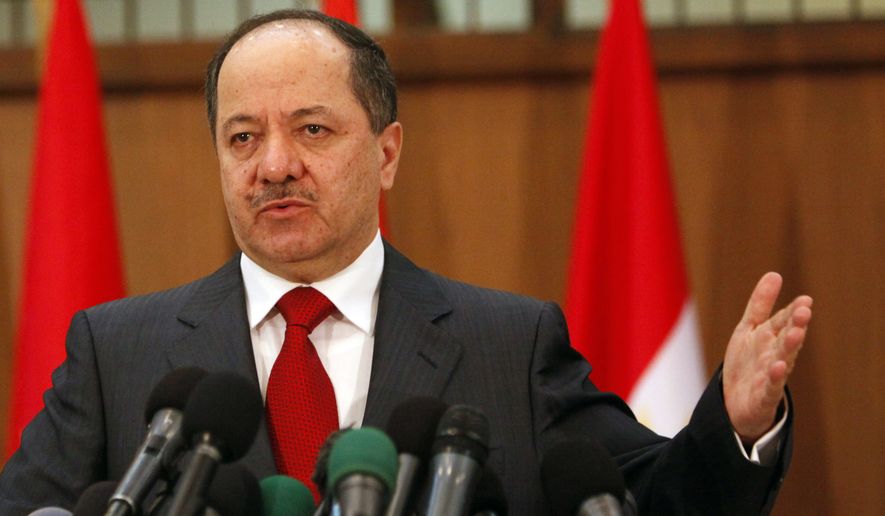The president of Iraqi Kurdistan said Wednesday that Kurds will hold a referendum on independence from Iraq when hostilities surrounding the war against Islamic State extremists are resolved.
“I cannot say if it will be in the next year, or when, but certainly the independent Kurdistan is coming,” said Masoud Barzani, who is town this week for a series of closed-door meetings with Obama administration this week, his first trip to Washington in four years.
At an event hosted by the Atlantic Council and the U.S. Institute of Peace, Mr. Barzani said his people want to independence to come peacefully, adding that Kurds have “delayed” holding a referendum because they are manning the front lines of the war against the Islamic State.
“It will take place when the security situation is resolved,” Mr. Barzani said.
His remarks Wednesday came against a backdrop of uncertainty over how the rest of the world — let alone Baghdad — might respond if the Kurdistan Regional Government moves to break away from Iraq.
White House officials say President Obama and Vice President Joseph R. Biden told Mr. Barzani during a meeting this week that the U.S. remains committed to a united, federal system in Iraq centered in Baghdad.
SEE ALSO: Iraq waiting on F-16 fighter jets, U.S.-trained pilots for Islamic State battle
While Mr. Barzani said KRG relations with Baghdad have warmed since Iraqi Prime Minister Haider al-Abadi came to power last year, he pointed to ongoing tensions over Iraq’s oil revenues. Under current agreements, Baghdad is supposed to share 17 percent with the KRG, Mr. Barzani said.
“Well, we have not received 17 percent,” he said.
An independent Kurdish state would also cause problems for Turkey, Iran and Syria, all of whom have sizable Kurdish minorities.
While roughly five million Kurds live within KRG territory in Iraq, they make up roughly 10 percent of the populations of Iran and Syria, and nearly 18 percent of Turkey.
The notion of Kurdish independence has long been sensitive. But leaders like Mr. Barzani seem increasingly emboldened since Kurdish peshmerga fighters are taking a lead role in the U.S.-backed war against the jihadi Islamic State movement, also known as ISIS and ISIL. The al Qaeda-inspired group declared a caliphate on the edge of KRG territory last year.
Mr. Barzani sought Wednesday to portray the Islamic State group as being on the path to defeat in Iraq as a result of aggressive ground operations already undertaken by the peshmerga. The peshmerga have “destroy[ed] the myth of ISIS” and taken back some 8,000 square miles of territory from the terrorists, he said, while some 1,200 Kurdish fighters have been killed and roughly 7,000 wounded in the fighting.
SEE ALSO: Kerry hopes to win pause in Yemen war as he heads to talks
Mr. Barzani said the peshmerga need more weapons to “end the fight sooner” against the Islamic State. But he declined to second previous criticisms by Iraqi Kurdish leaders that the Obama administration has refused to allow U.S. weapons transfers directly to the KRG.
In February, the KRG’s permanent representative in Washington slammed the administration’s policy of requiring such weapons as heavy machine guns to pass through Baghdad for inspection before being passed on to the KRG.
“We’re at the front line, we’re at the heart of the conflict, we are the most effective force in the conflict,” Bayan Sami Abdul Rahman said at the time. “Why do our weapons have to go to Baghdad?”
Mr. Barzani seemed less than eager to address the issue Wednesday. When pressed on whether he’d raised it at the White House this week, he said he believes Mr. Obama and Mr. Biden want weapons to go to the Kurdish fighters.
“The important point here is the peshmerga get these weapons,” he said. “How they get them is not as important as the fact that peshmerga need the weapons.”
• Guy Taylor can be reached at gtaylor@washingtontimes.com.




Please read our comment policy before commenting.